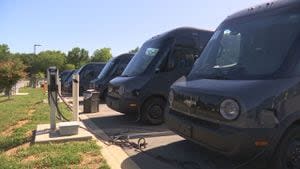
As the shift towards electric vehicles continues to gain momentum, more and more companies are incorporating EVs into their fleets. Research suggests that by 2030, there could be up to four million electric fleet cars on the road, in addition to the growing number of personal electric vehicles already in use.
Transitioning to electric vehicles is seen as one of the fastest ways for companies to reduce their carbon emissions, especially for those with strict sustainability goals. This change is crucial, as transportation accounts for a significant portion of an organization’s environmental impact.
For some companies, like Concord’s Amazon distribution center, introducing electric delivery vans into their fleet has proven to be a smooth transition. Drivers have reported saving time and increasing efficiency thanks to the features of the electric vans. These vans have a range of around 150 miles, making them ideal for shorter delivery routes within a 75-mile radius.
However, the transition to EVs is not without its challenges. Establishing charging infrastructure is a key first step, both at company facilities and throughout the community to support drivers on the road. Mecklenburg County, for example, faced initial difficulties in implementing EVs due to charging infrastructure limitations.
Currently, both Mecklenburg County and Amazon are gradually introducing more EVs into their fleets as older vehicles phase out. While neither company is expected to fully transition to all-electric transportation, the shift towards EVs in fleet operations is a step in the right direction.
Despite the progress in electric fleet vehicles, challenges remain for larger vehicles like trucks that rely on diesel or gas. The limitations of current battery technology make it difficult to develop cost-effective electric options for heavy-duty transportation. Experts suggest alternative solutions, such as hydrogen fuel cells, may be more practical for long-haul trucking in the future.
While EV technology has its limitations, it is still considered a valuable option for certain applications, particularly in urban environments. Dr. Robert Cox from UNC Charlotte emphasizes the importance of starting with fleets to increase adoption of EV technology. By showcasing the benefits of EVs through fleet operations, more companies and individuals may be encouraged to make the switch to electric vehicles in the future.


